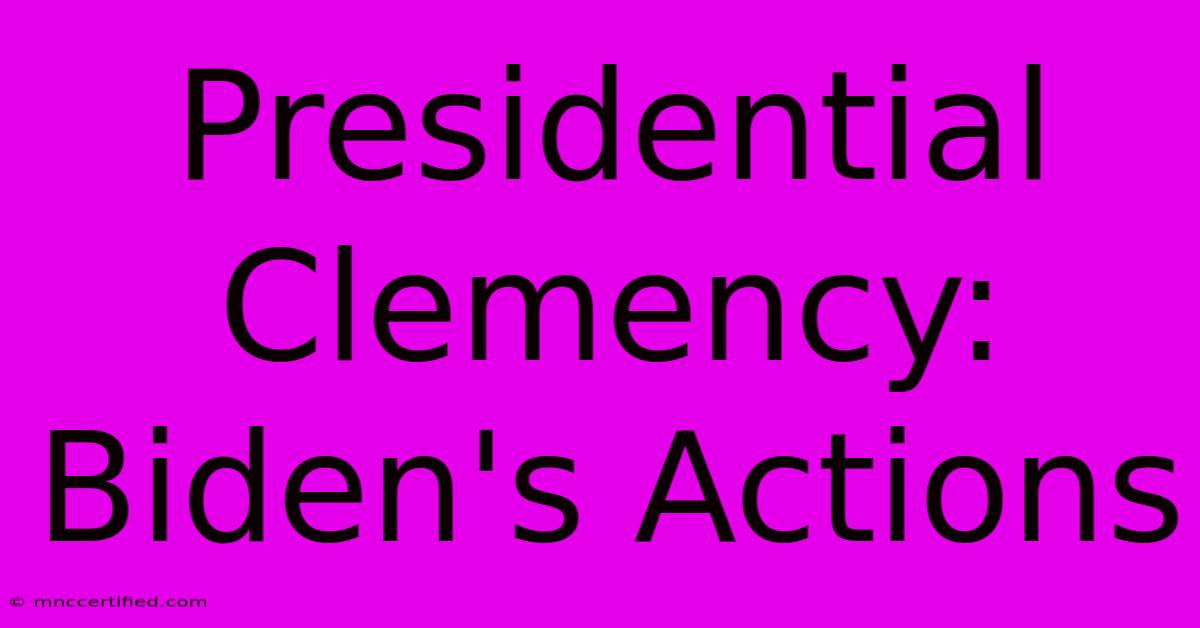Presidential Clemency: Biden's Actions

Table of Contents
Presidential Clemency: Biden's Actions and Their Implications
President Biden's use of presidential clemency has sparked considerable debate and analysis. Understanding the scope of his actions, their impact, and the legal framework surrounding them is crucial for anyone following current events and American politics. This article delves into the specifics of Biden's clemency grants, examining their rationale, beneficiaries, and broader implications for the justice system.
Understanding Presidential Clemency
Presidential clemency, a power explicitly granted to the President by the US Constitution (Article II, Section 2), encompasses several actions:
- Pardon: A full forgiveness of a federal crime, eliminating any associated penalties or disabilities.
- Commutation: A reduction of a sentence, typically shortening a prison term.
- Reprieve: A temporary postponement of the execution of a sentence.
- Amnesty: A pardon extended to a group of individuals, often for political offenses.
The power is absolute, meaning the President's decision is not subject to judicial review. However, there are ethical and political considerations that typically guide such decisions.
Biden's Clemency Grants: A Detailed Look
President Biden's approach to clemency differs from his predecessors in several ways. While specifics vary, a common thread is the focus on individuals convicted of non-violent drug offenses, particularly those serving lengthy sentences deemed disproportionate to their crimes. This aligns with a broader movement advocating for criminal justice reform.
Key Characteristics of Biden's Clemency Initiatives:
- Emphasis on Drug Offenses: A significant portion of the pardons and commutations granted have been for individuals convicted of drug-related crimes. This reflects a growing awareness of the disparities in sentencing for drug offenses and the need for rehabilitation.
- Focus on Rehabilitation and Second Chances: Many recipients have demonstrated a commitment to rehabilitation and reintegration into society following their incarceration. This emphasis underlines the belief that second chances are essential for positive societal impact.
- Transparency (to a degree): While the selection process isn't completely transparent, the White House has provided some information regarding the criteria used for considering applications. This allows for some public accountability.
- Limited Scope Compared to Some Past Presidents: While significant, the number of clemency grants issued by President Biden remains comparatively lower than under some past administrations.
Criticism and Controversy
Despite the positive aspects of Biden's clemency efforts, the process has faced criticism:
- Concerns about fairness and consistency: Critics argue that the selection process lacks transparency and consistency, raising questions about potential bias in granting clemency.
- Insufficient scope of reform: Some advocate for a far broader application of clemency to address systemic issues within the criminal justice system.
- Political motivations: Opponents suggest political considerations may influence the selection of recipients.
The Broader Implications
Biden's actions on clemency extend beyond individual cases. They represent a significant policy statement on criminal justice reform and the role of compassion in governance. His approach signifies a shift towards a more restorative justice model, focusing on rehabilitation and reintegration rather than solely punishment. This aligns with broader social and political discussions regarding sentencing reform and the war on drugs.
The long-term effects of Biden's clemency initiatives remain to be seen. However, they contribute to a crucial conversation about how the justice system can better serve the interests of both individual offenders and society as a whole. Continued monitoring and analysis are needed to fully assess their impact.
Conclusion: A Measured Approach to Reform
President Biden's use of presidential clemency reflects a deliberate, if somewhat limited, attempt at criminal justice reform. While facing criticism, his actions underscore the ongoing debate surrounding sentencing disparities, rehabilitation, and the importance of offering second chances. The legacy of his clemency decisions will depend on their long-term effects on recidivism rates, public safety, and the overall perception of fairness within the American justice system. Further research and analysis are needed to fully understand the impact of these policies.

Thank you for visiting our website wich cover about Presidential Clemency: Biden's Actions. We hope the information provided has been useful to you. Feel free to contact us if you have any questions or need further assistance. See you next time and dont miss to bookmark.
Featured Posts
-
Astana Vs Chelsea Post Match Ratings
Dec 13, 2024
-
Rams Vs 49ers Betting Picks And Promos
Dec 13, 2024
-
Lakers News Le Bron Out Personal Issue
Dec 13, 2024
-
Elden Ring Nightreign Update
Dec 13, 2024
-
Shrine Draws Thousands Despite Cold
Dec 13, 2024